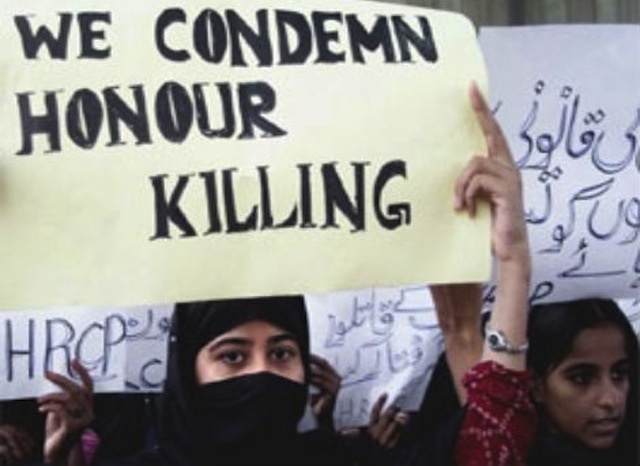Sandeela Kanwal immigrated to the United States from Pakistan, escaping the strict social codes placed on women. Or so she thought. Instead, Sandeela’s father murdered her for seeking a divorce from an arranged marriage.
Shortly after she arrived in Georgia, her father began pressuring her to marry her first cousin to speed up his immigration process. She was uncertain, but he persisted, and so she married him in 2002. Her husband did not arrive in Georgia until 2008 because of immigration hold-ups. After arriving, he almost immediately moved to Chicago alone. Feeling her duty to her family had been fulfilled, the 25-year-old Sandeela contacted a divorce lawyer.
When her father found out the 25-year-old Sandeela was seeking a divorce, he was angry. The two argued frequently, and he forbid her to seek a divorce. Sandeela reached out to a friend, asking for help getting out of her house because she feared her family would try to poison her food or take other measures against her. She said that if they found out she had actually filed for divorce, she would be in danger.
On Sunday, July 6, 2008, police responded to a 911 call at Rashid’s house. Sandeela had been strangled to death. Her body was found in her bedroom. In custody, Rashid called Sandeela “filthy” and said she dishonored him and his family. In Pakistan, he said, Sandeela would have been stoned to death. He said he killed her because she wanted a divorce from the marriage he arranged for her and because he believed she was involved with another man.
He told officers he had done the right thing. “There was no noise,” he said of the murder. “Those who want to get things done, do it silently.”
Rashid’s conviction of malice murder and life sentence in prison were upheld by the Georgia Supreme Court this January. This is just one of thousands of honor killings each year. The Human Rights Watch defines honor killings as “acts of vengeance committed by male family members against female family members, who are held to have brought dishonor upon the family.” Dishonor can result from a variety of things: refusal of arranged marriage, being sexually assaulted, committing adultery or seeking divorce (as in Sandeela’s case).
Cases have even been documented where girls have been murdered for things like dressing provocatively or “too Western,” as well as holding hands with or even talking to an unrelated male.
It is hard to say how many honor killings occur each year. Many go unreported, their perpetrators unpunished. Some societies condone the murders as a restoration of family honor. Amnesty International cites “discriminatory attitudes and beliefs about women” as one of the major causes for the lack of documentation. These honor killings are discussed in the context of the Middle East and South Asia, yet the United Nations Special Report on Extrajudicial, Summary and Arbitrary Executions reports that these murders occur in countries as varied as Bangladesh, Brazil, Ecuador, Egypt, India, Iran, Iraq, Israel, Italy, Jordan, Morocco, Pakistan, Sweden, Turkey, Uganda, the United Kingdom, the United States, and Canada.
In 2000, the UN Population Fund estimated that 5,000 women and girls are victims of honor killings annually – by members of their own families. This number, while probably much lower than the actual total, still gives some idea of the scope of this occurrence.
Honor killings tend to occur in societies in which historical concepts of justice conflict with modern definitions of human rights. In some cases, society’s definition of justice is in conflict with statutory law – as in Sandeela’s case. Honor killings are not as prevalent in America, Canada and the UK as they are elsewhere – for a reason. The U.S. enjoys the advantage of a free press constantly pushing for transparency from its officials. If a local police chief began systematically turning a blind eye to the abuse and murder of women in an American community, you can bet someone would take notice.
But in a lot of communities, that oversight is not there. There is a community mentality behind honor killings. A group of people shares a set of values – based on tradition, Shari’a, or an antiquated view of the role of women – and base their understanding of virtue and honor off of that. Having a particular view of honor is not the problem – it is that murder is justified as a result of a failure to uphold that view.
Complicity of community, officials, and even other women strengthens the view of women as property that should be controlled. It also reinforces the idea that preservation of honor is a private, family matter – even if it is preserved through murder – that should be outside the jurisdiction of law enforcement. This communal complicity also stifles accurate reporting of crimes against women worldwide.
Honor killings fit the UN definition of violence against women: “any act of gender-based violence that results in, or is likely to result in, physical, sexual or psychological harm or suffering to women, including threats of such acts, coercion or arbitrary deprivation of liberty, whether occurring in public or in private life.”
Murder of women in the name of so-called honor is a gender-specific form of discrimination and violence. In societies where these killings occur unpunished, governments are failing in their responsibility to protect their citizens – all of them. The problem is that even in the Western world, there is a tendency to shy away from the term “honor killings,” in favor of prosecution as a typical murder or domestic violence case. But honor killings must be distinguished from other murders, because of their motivation based on codes of morality and behavior. A man who murders an unfaithful wife may feel justified in his action as he seeks revenge for her infidelity, but he does not feel a moral obligation, in the eyes of his culture or religion, to end her life in order to restore his family’s honor.
In the West, serious domestic violence exists – including incest, child abuse, marital rape, marital battering, marital stalking and marital post-battering femicide. But there is no cultural pattern of fathers specifically targeting or murdering their teenage or young adult daughters, nor do families of origin participate in planning, perpetrating, justifying and valorizing these murders. Sandeela’s case is by no means the norm – these characteristics define the classic honor killing structure.
Western politicians have shied away from the term “honor killing,” like the Canadian politician who said calling honor killings brutal was a pejorative term. It should be pejorative. We, as a society, should condemn this practice – which is at once a violation of our laws and a unique case that differs from traditional murder. Domestic violence, violence against women, and murder rates are high enough in the U.S. We have enough blood on our hands. We must prevent yet another manifestation of sexism and violence against women from ravaging our society.


